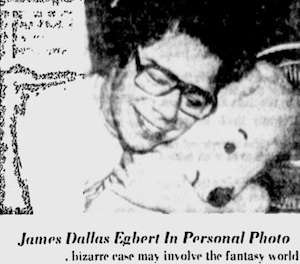Friday A/V Club: Dungeons & Dragons Will Melt Your Mind!
The 1982 film Mazes and Monsters

In 1979, a Michigan State student named James Dallas Egbert III disappeared from campus. Egbert was a Dungeons & Dragons fan, and the media latched onto speculations that he had died in the campus' steam tunnels while playing a live-action version of the game. A moral panic over role-playing games was just getting underway, and the rhetoric around the case tended toward the Gothic. "We've sat here many an hour, all of us wondering—is Dallas the dungeon master," a private detective hired by Egbert's family said at one point. "Or if he isn't the dungeon master, is there some other dungeon master who has pulled all of us into this game by using him as some sort of pawn?"
Such speculations turned out to be untrue: Egbert had taken a bus to New Orleans, where he attempted suicide for reasons unrelated to the game. (A year later, he would succeed in killing himself.) But as the D&D panic progressed in the early '80s, the story became a sort of half-remembered cautionary tale for parents nervous about this strange new hobby. Rona Jaffe wrote a novel, Mazes and Monsters, that was loosely inspired by the most lurid accounts of the case. And in 1982, that book became a made-for-TV movie. Vague recollections of the televised Mazes and Monsters mixed with vague recollections of Egbert to form a hazy folk memory: not a precise tale with names and dates, but a legend about a guy who got lost or died or was somehow harmed because a game had taken over his life.
I've embedded the movie below. The protagonists, a collection of troubled college kids alienated in different ways from their families, get drawn into a role-playing game the way characters in other movies get drawn into drugs. (Indeed, the whole thing is stuctured like an anti-drug picture.) One of the students—played by a young Tom Hanks, whose only other notable credit at this point was the sitcom Bosom Buddies—loses the distinction between fantasy and reality, becoming convinced that he really is the cleric he plays in the game. By the end of the picture (SPOILER ALERT) he has stabbed a man, come close to killing himself, and lost his original identity permanently. The movie makes some small attempts at balance, suggesting that the game can help less fragile people work through their fears. But when the best you can say about your subject is that it's potentially therapeutic but dangerous, that's ultimately just one more parallel with an anti-drug film.
The script is clumsy even by '80s TV-movie standards—when the screenwriter wants to tell us that a character has an IQ of 190, for instance, he does it by having the boy's mom randomly mention the fact while greeting him—and the acting is mostly awful. (Hanks isn't bad for most of the movie, at least in comparison to the rest of the cast, but his performance goes over the top when his character loses his mind.) If you don't think you can sit through the whole thing, jump to 1:07:20 for a particularly potent bit of fearmongering dialogue. Then go to 1:32:34 to check out the climax atop the World Trade Center, a scene that echoes those urban legends where LSD convinces people that they can fly.
https://www.youtube.com/watch?v=FpcL-fQNPfQ
Bonus link: That's the secular version of the D&D scare. For the Christian version, I give you Jack T. Chick.


Show Comments (55)